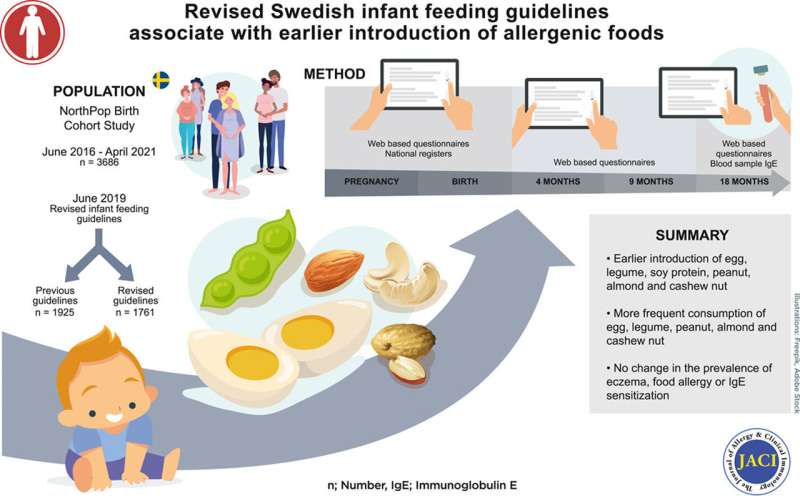This article has been reviewed according to Science X's editorial process and policies. Editors have highlighted the following attributes while ensuring the content's credibility:
fact-checked
peer-reviewed publication
trusted source
proofread
Allergenic foods do not increase risk for infants, research finds

Eggs, legumes including soya and peanuts, almonds and cashew nuts are now being introduced earlier in infant diets following revised advice in Sweden on the introduction of certain foods. However, there has been no change in the rate of food allergies or eczema in infants at the age of 18 months.
These results are from a recent study by the NorthPop research project conducted at Umeå University and Region Västerbotten published in the Journal of Allergy and Clinical Immunology.
"Randomized controlled trials have shown that introducing potentially allergenic foods such as peanuts and eggs during the first year of life can reduce the risk of developing food allergies," says Professor Christina West, head of asthma and allergy research in NorthPop.
"The theory is that early and repeated exposure to foods promotes the development of tolerance; in other words, the immune system learns to tolerate these foods."
Revised advice
The study involved more than 3,500 families within the large, population-based NorthPop project. All families had received advice from the Swedish National Food Agency that children can try small samples of solid food from the age of 4 months at the earliest, as long as it does not interfere with breastfeeding.
About half of the families had also received the revised advice from the Swedish National Food Agency published in 2019. This emphasized that foods such as cooked eggs, milk, nuts and legumes, including peanuts, should be introduced to all children during the first year of life.
These foods provide essential nutrients and can contribute to healthy eating habits that have the potential to reduce lifestyle diseases in the long term. However, there was insufficient scientific evidence to recommend the active introduction of allergenic foods for the prevention of allergies.
"Because the advice changed while the NorthPop project was still ongoing, we had a unique opportunity to examine the points at which different foods are introduced into infants' diets and how often they eat them," says Christina West.
Legumes and peanuts
Parents completed food frequency questionnaires when their children were 4 and 9 months old.
"The main difference was that more children ate legumes at 9 months of age. The proportion that ate legumes increased from 55.2% to 69.8%. More children also ate peanuts at the same age, with an increase from 29.2% to 43.2%. Despite this increase, the proportion of children introduced to eggs and peanuts was lower compared to international data," says Jonas Österlund from the Department of Clinical Sciences at Umeå University, and first author of the study.
No increased risk of allergic diseases
The researchers found no difference in the prevalence of food allergies and eczema at 18 months of age in relation to the changed advice.
"Our results show that introducing allergenic foods in the first year of life does not increase the risk of food allergies or eczema. We also did not see any reduction in risk, despite the fact that more children were introduced to allergenic foods at 9 months of age after the revised advice was introduced. Possible explanations are that the absolute difference was low and that few children had been introduced to allergenic foods at 4 months of age. There is debate about when foods should be introduced in the first year of life to have the greatest effect on tolerance development," says Jonas Österlund.
The NorthPop population study provides unique opportunities for research on the health of children and families with children. The goal is to include 10,000 families and follow the children until the age of 7, which will also allow for follow-up on the results.
More information: Jonas Österlund et al, Revised Swedish infant feeding guidelines associate with earlier introduction of allergenic foods, Journal of Allergy and Clinical Immunology (2023). DOI: 10.1016/j.jaci.2023.08.037. www.sciencedirect.com/science/ … ii/S0091674923012496




















